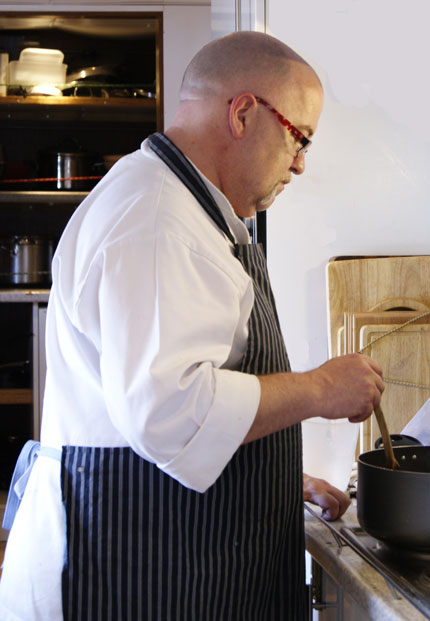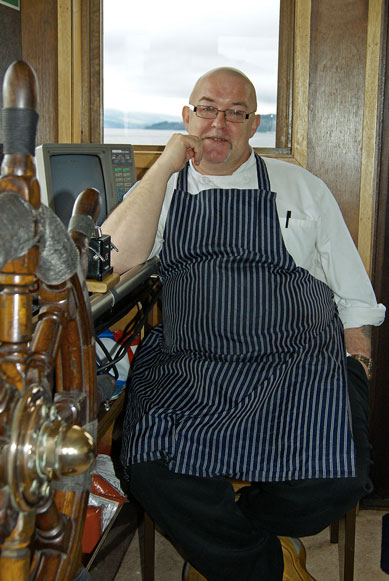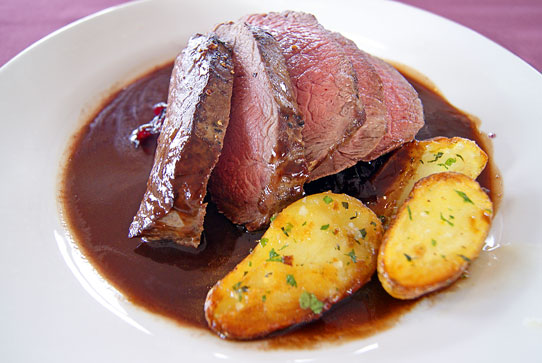Glen Tarsan is one of the converted fishing boats in The Majestic Line fleet. It’s now a cruising hotel with a fabulous restaurant, or you could describe it as a ‘moving restaurant with rooms’; but it has such a reputation for fine food that it has been welcomed as a static ‘botel’ over the winter months. Chef Stephen Boswell is one of The Majestic Line chefs and responsible for its celebrated cuisine.
 I asked Steve whether cooking was his family business. “I have always had a passion for food – mainly out of necessity as my mother was a terrible cook and my grandmother was worse! It’s always been the men in the family who cook – my father cooked, my grandfather cooked, and I started about age 12.” Mum wasn’t a complete disaster in the kitchen, though. “I can remember Mother made apple strudel, and I loved it – she had never made anything as fancy as an apple strudel before – I was impressed and my friends were impressed, and that stuck in my mind.”
I asked Steve whether cooking was his family business. “I have always had a passion for food – mainly out of necessity as my mother was a terrible cook and my grandmother was worse! It’s always been the men in the family who cook – my father cooked, my grandfather cooked, and I started about age 12.” Mum wasn’t a complete disaster in the kitchen, though. “I can remember Mother made apple strudel, and I loved it – she had never made anything as fancy as an apple strudel before – I was impressed and my friends were impressed, and that stuck in my mind.”
“I was the first one in my family to take up cheffing. I had learnt the building trades, and when I was 15 I ran away from home to work on a Clyde Puffer, because my father had been on a puffer. I worked as a deckhand-cook, but the school board caught me and dragged me back! The company had folded by the time I was old enough to get back into it – the puffers were dying out. I tried my hand at waiting, as a hall porter, on the building sites, I was a coalman for a while. But my hobby had always been cooking, and in my 20s I went to Glasgow and washed dishes in an Italian restaurant. One day the sous-chef was asked to do something that he couldn’t manage; I did it, and got promoted. Then I went to the Trust House Forte hotel in Glasgow and rose through the ranks quickly, so within 3 years I was head chef.
Chef Steve is passionate not only about food but about cooking as a life skill: “People can’t afford to go out to eat at fancy restaurants so they’ve got to learn to cook, especially these days, and it’s simple. I’m usually the one who cooks at home – I can make soup from a stone! You can see from the galley that you can cook in any space and you can do any type of meal – it doesn’t have to be macaroni cheese, you can present Chinese, Indian – everyone should be able to cook our national dishes!”
“I’ll always be a ‘hands-on’ solo chef. You don’t have to go through the route (like Marco Pierre White and Gordon Ramsay, say) of going to France for so many years, smashing your head against a wall and where the chef’s beating you up. It doesn’t have to be that way – it’s the love of food that comes first, then you’ll get it. Treat food simply, so whatever your main ingredient is, you can still taste it underneath everything else. Complement the food, don’t drown it. That’s the secret of Michelin chefs – complement the ingredients, buy the best – so why not do that in a small pub or restaurant, too?”
Does Steve find there are particular difficulties when one has a kitchen that rocks about a bit? “I had been trying to get into the Majestic Line from 2 or 3 years after it started, and I have been here 3 years now – I love it, it’s fantastic. Sourcing the ingredients is very important, because good suppliers are hard to find. The most difficult part is cooking when the boat’s rolling, but I have the knack! There isn’t a weather that I can’t cook in. But I always carry seasickness cures for the guests – that really work!” he says with a cheeky grin. “If passengers have any special requirements I can prepare a menu to suit them. One week I had to run three menus because of special diets – difficult, but it’s all down to timing, really!”
 “The 6-day voyage is the longest one on the itinerary, but we can do private hires that may be up to two weeks. I love my job. For ten years previous to this I did the ‘freelance’ thing, away from home, and I missed my kids, but I have a daughter who’s 10 years old this year, and I want to see her growing up.
“The 6-day voyage is the longest one on the itinerary, but we can do private hires that may be up to two weeks. I love my job. For ten years previous to this I did the ‘freelance’ thing, away from home, and I missed my kids, but I have a daughter who’s 10 years old this year, and I want to see her growing up.
How does Steve describe his cooking? “The first couple of days the menus onboard are traditional, and I do try to keep to local ingredients, but I cook them in different styles so people can see that local foods can be presented in a contemporary or international fashion. You don’t have to have a plain steak, you don’t have to have a lamb shank with onion gravy and mash. I think that after a week of just traditional food you wouldn’t be able to move!”
I asked Steve if he has any signature dishes. “I believe our sticky toffee pudding is the best, so I usually try to include that, though it takes different forms; and I do a Haggis: it’s a pan haggis that doesn’t involve heart and lungs, which might put some people off, so it’s just liver and lamb. I do a seafood buffet which is spectacular – we have some of the best shellfish in the world, and I use different spices, including a tagine spice-blend for lobster.” The seafood banquet is an eagerly anticipated part of the voyage and is a spread of epic proportions. Yes, lobster, but also crabs, mussels, prawns, clams, langoustines, scallops, cooked in a variety of ways. Steve buys these shellfish from a supplier on the slipway at Tarbert. It doesn’t get much fresher than this – bags moving with still-alive crabs and lobsters. Steve treats seafood with care and respect, and acts as a roving ambassador for the best that Scotland can offer; and its offers a lot.
Scotland has, in the past, been famed for great ingredients but poor meals, an emphasis on sweet or fried foods, with the celebrated deep-fried Mars Bar encompassing both genres. “Internationally we have had a reputation for bad food, but in the last ten years both English and Scottish Culinary Olympic teams have beaten France, so we are up there – the food’s fantastic now. Of course, you still find the ‘deep-fried food’ places, and we are something like 50,000 chefs short throughout the UK. We still suffer from the laziness of the owners, they haven’t want to pay a decent wage for decent food, so they recruited anyone who could operate a fryer. But go to Glasgow or Edinburgh and you’ll see massive improvements in the food, they are up to date with London. The problem was that for years nobody complained, but now I’m glad to say that customers will complain, and restaurants are paying attention!”
“When I was freelancing I was ‘labour for hire’ and I travelled all over Scotland because of the shortage of chefs. On my own I did up to 32 two-rosette standard fine-dining meals, and 94 one-rosette bar meals, in a kitchen about the size of this wheelhouse!” We were standing by the ship’s wheel in a room of about 2 x 4 metres which is in fact slightly larger than the galley which is Steve’s usual place of work on the Glen Tarsan. “I get greedy over kitchens, though – I work a 2-weeks on, 1-week off schedule, but after I’ve worked in the kitchen for a week or two I don’t want anyone else to come in and use ‘my’ galley!”

In the winter The Majestic Line ship is static, tied to a pontoon, so they have a floating restaurant offering dinner, and bed-and-breakfast – a ‘botel’. Dinner is always a six-course: canapés, starter, main, dessert, cheeses, and home-made sweets. “I think my best training was at Trust House Forte, where I got to work as a carvery chef and a banquet chef. But some were there for 5 or 6 years and never got to see the other sections. One chef came and wanted to work as a baker and pastry chef, but couldn’t make bread, and I could, so I said to myself, “I don’t want to be in his situation, I’m going to learn everything.”
Although a great advocate of traditional Scottish dishes Steve is not afraid to push the envelope. “I’m doing a little of the experimental stuff, too – a bit of the ‘Heston’, like hot jellies, but I haven’t perfected that yet, so it’s not on this week’s menu! I love trying new cooking methods, and my son is into that – he worked at the Linen Room with a great young chef, Russell Robertson, in Dumfries and he was a Heston Blumenthal devotee. I like a challenge, and try to keep up to date, keep my finger on the pulse, though most of Scotland is about 5 years behind what’s happening in London.”
Chef Steve Boswell does have a few logistical problems that most of his peers don’t have to worry about. He can’t just pop out for a litre of milk. “I get the deliveries the day the passengers arrive, and generally the ingredients are vac-packed and will last me 3 or 4 days, and then I start picking up more groceries as we go along. I also keep a freezer supply in case bad weather prevents us collecting our shopping list.”
“I think I have tried cooking everything on this boat, and presented everything that’s possible from a galley this size. I’ve been here for 3 years, and my menu changes every week – I never present the same thing twice, unless it’s a ‘standard’ – shortbread, haggis, sticky toffee pudding. The average weight gain is 4 pounds in 6 days!” That sticky toffee pudding is considered by many of the Majestic Line passengers to be the best they have tasted and is partly responsible for that weight gain.
Steve seems to be creating his own culinary dynasty – well, the Roux brothers did it! “Both my sons are into cooking: the younger one has been on Iron Chef as Martin Blunos’ sous-chef, and the other is a very good pastry chef, working locally. I started my children cooking at the age of 6 or 7 at home, so I hope to have a family of chefs!”
The Majestic Line
3 Melville Crescent
Edinburgh
EH3 7HW
Email: info@themajesticline.co.uk
Phone: +44 (0)131 623 5012
Visit The Majestic Line here
Read more articles about The Majestic Line here
Interview by Chrissie Walker © 2018
